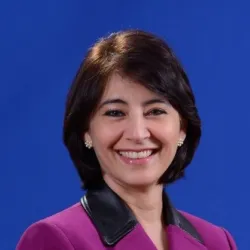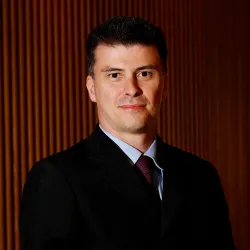Building cyber resilience: Stress testing, AI threats, and operational risk strategies
Building cyber resilience: Stress testing, AI threats, and operational risk strategies
Building cyber resilience: Stress testing, AI threats, and operational risk strategies
Date: March 25-27
Time: 9:30am - 12:30pm (EDT) | 1:30pm - 4:30pm (GMT)
Location: Virtual
Chair and speakers

Arvinder Bharath
Lead digital expert
International Monetary Fund
Arvinder Bharath brings to bear a blend of experience spanning over 30 years in technology, banking, and policy setting. She started her career in technology working with corporates, conglomerates and tech and telecom giants such as British Telecom, Nortel Systems, Cisco, Compaq and Hewlett Packard. She later joined Barclays Bank where she held senior positions in technology, mergers, acquisitions, and separations across the globe. She then returned to the Caribbean to lead RBC Royal Bank as president and country head for Trinidad and Tobago. Arvinder subsequently moved to the Central Bank of Trinidad and Tobago as Deputy Inspector of Financial Institutions, transitioning to lead Financial Technology, Information Security and Knowledge and Information departments. She is currently a Digital Risks Expert with the IMF where she provides technical assistance to member countries in management of digital and cyber risks arising from digitalization of the financial services sector, public financial management and adoption of digital currencies. She is involved in various international working groups and forums on transformative technologies such as Quantum Computing, generative AI, DeFi and others.
Arvinder holds a BSc Hons in Information Technology and an MBA in Banking – both from the University of London.

Eliud Ramocan
Head of cyber resilience and threat intelligence
Bank of Jamaica
Eliud "El-G" Ramocan is responsible for cyber resilience and threat intelligence at the Bank of Jamaica, leading Jamaica’s cyber resilience framework for the financial sector and also chairs the Cyber Risk Technical Working Group of the Caribbean Group of Bank Supervisors.
With a distinguished background in technology, economics and strategy early in his career, El-G was designated a short-term IMF Technical Assistance Expert at age 28 and later appointed by his country to upgrade the cyber infrastructure across the military, police force and mission-critical systems in cooperation with the Government of Israel. Following this, he was seconded to the Financial Services Commission in Jamaica as CIO where he orchestrated a swift and successful recovery following a major ransomware attack. With a wealth of resilience, he crafted his country’s Ten Cyber Resilience Principles for the Financial Sector, alongside policies centred on cyber risk governance and cybersecurity preparedness.
He holds a degree in Computer Science and Economics and an MBA from the University of the West Indies. Then further pursued studies at Harvard Kennedy School of Government focusing on Cybersecurity Policy and Strategic Management for Regulatory and Enforcement Agencies. Giving back, he lectures at the university-level in cybersecurity, risk governance and project management and travels extensively as a speaker and accomplished author.

Aristides Cavalcante Neto
Chief of cybersecurity and technological innovation office
Central Bank of Brazil
Bachelor of Science in Computing and Master of Business Administration, Mr. Cavalcante works at Central Bank of Brazil for 22 years. He is Deputy Head of the IT department and Chief of Cybersecurity and Technological Innovation Office. He is in charge of fostering and collaborating in initiatives related to cybersecurity and technological innovation in the Brazilian financial system, like Distributed Ledger Technology (DTL), Open Banking and Regulatory Sandbox.

Sukhvir Notra
Senior information security specialist
Bank for International Settlements
Mr. Sukhvir Notra is a Senior Information Security Specialist at the Bank for International Settlements (BIS). He has been an information security professional for over 10 years with majority of his career focused on defensive cyber operations. At the Cyber Resilience Coordination Centre (BIS), Sukhvir is responsible for development and delivery of cyber range exercises, managing cyber resilience assessments of central banks and other projects aimed at strengthening cyber resilience and promoting collaboration in the central bank community. His primary interest include leadership, operations, information security readiness and risk management. He has a Bachelors of Electrical Engineering degree and a Masters of Cyber Security from University of New South Wales.

Dinesh Shah
Senior payments technical adviser
Bank of Canada
Dinesh is Senior Payments Technical Advisor to the Bank of Canada’s Payments Policy and Strategy team. He provides strategic and thought leadership to inform research and policy development in payments. Prior to this role Dinesh led the Bank’s Fintech Research team to design a CBDC, and the Jasper series of projects, towards solving difficult problems in domains such as privacy, security, offline CBDC, universal access and FMI modernization using frontier technologies. He has been deeply involved in policy development and international collaborations.
Before joining the Bank, Dinesh has been a co-founder and architect at various start-ups, developed fixed-income trading and risk management systems at financial institutions, and provided expertise on the application of leading-edge technologies to securities trading and clearing firms. Dinesh holds a BSc (hons) in Physics with Computing from The University of Kent in the U.K.

Simon Onyons
Managing director
FTI Consulting
Simon Onyons brings over two decades of information technology and cybersecurity experience, most recently in the area of finance regulation. He currently serves as a senior advisor to the UK National Cyber Security Centre (NCSC), where he works on the NCSC Advisory Group to support the NCSC Industry 100 initiative to improve cyber resilience across UK industry and will remain in this role while at FTI Consulting.
Prior to FTI Consulting, Mr. Onyons was a Senior Vice President and Head of EMEA Governance, Risk and Compliance within Global Information Security at Bank of America. While at Bank of America, he created and co-led the award-winning Financial Sector Cyber Collaboration Centre (FSCCC) and served as Chair of the Cyber Security Working Group of the Association for Financial Markets in Europe.
Before that, Mr. Onyons worked in cybersecurity at the Financial Conduct Authority (FCA), where he was tasked with defining and implementing the strategy, policy, and structure of the FCA’s cyber supervisory division. Whilst at the FCA, he worked across a range of international working groups and collaboration efforts with global regulators and co-authored best practice cyber resilience guidance for the G7 Cyber Experts Group, the Committee on Payments and Market Infrastructures (CPMI), and the International Organization of Securities Commissions (IOSCO).
Previously, Mr. Onyons worked in business continuity and recovery for a number of IT service providers after beginning his career at IBM.
Agenda
13:30 – 14:00
Chair introduction & ice breaker
13:30 - 14:00
- Introduction and welcome from the chairperson
- Overview of the agenda and featured speakers
- Brief introduction to each of the delegates and their expectations
Arvinder Bharath brings to bear a blend of experience spanning over 30 years in technology, banking, and policy setting. She started her career in technology working with corporates, conglomerates and tech and telecom giants such as British Telecom, Nortel Systems, Cisco, Compaq and Hewlett Packard. She later joined Barclays Bank where she held senior positions in technology, mergers, acquisitions, and separations across the globe. She then returned to the Caribbean to lead RBC Royal Bank as president and country head for Trinidad and Tobago. Arvinder subsequently moved to the Central Bank of Trinidad and Tobago as Deputy Inspector of Financial Institutions, transitioning to lead Financial Technology, Information Security and Knowledge and Information departments. She is currently a Digital Risks Expert with the IMF where she provides technical assistance to member countries in management of digital and cyber risks arising from digitalization of the financial services sector, public financial management and adoption of digital currencies. She is involved in various international working groups and forums on transformative technologies such as Quantum Computing, generative AI, DeFi and others.
Arvinder holds a BSc Hons in Information Technology and an MBA in Banking – both from the University of London.
14:00 – 15:00
Cyber resilience: Trends, challenges, and strategies
14:00 - 15:00
- Understand the evolving regulatory approach to cyber threats
- Explore cutting-edge developments in cyber threat vectors, including ransomware, advanced persistent threats (APTs), and vulnerabilities in cloud environments
- Discuss actionable approaches to enhance resilience, manage interconnected risks, and prepare for complex, multi-vector incidents
Eliud "El-G" Ramocan is responsible for cyber resilience and threat intelligence at the Bank of Jamaica, leading Jamaica’s cyber resilience framework for the financial sector and also chairs the Cyber Risk Technical Working Group of the Caribbean Group of Bank Supervisors.
With a distinguished background in technology, economics and strategy early in his career, El-G was designated a short-term IMF Technical Assistance Expert at age 28 and later appointed by his country to upgrade the cyber infrastructure across the military, police force and mission-critical systems in cooperation with the Government of Israel. Following this, he was seconded to the Financial Services Commission in Jamaica as CIO where he orchestrated a swift and successful recovery following a major ransomware attack. With a wealth of resilience, he crafted his country’s Ten Cyber Resilience Principles for the Financial Sector, alongside policies centred on cyber risk governance and cybersecurity preparedness.
He holds a degree in Computer Science and Economics and an MBA from the University of the West Indies. Then further pursued studies at Harvard Kennedy School of Government focusing on Cybersecurity Policy and Strategic Management for Regulatory and Enforcement Agencies. Giving back, he lectures at the university-level in cybersecurity, risk governance and project management and travels extensively as a speaker and accomplished author.
15:00 – 15:15
Break
15:00 - 15:15
15:15 – 16:30
Advance of AI and its implications on cyber security. Hand on look at offensive and defensive cyber operations using AI
15:15 - 16:30
- Overview of various AI technologies in the market today
- Breakdown of AI models and their capabilities
- Demo – Offensive cyber operations using ChatGPT
- Demo – Defensive cyber operations using ChatGPT
- Risks and future outlook
Mr. Sukhvir Notra is a Senior Information Security Specialist at the Bank for International Settlements (BIS). He has been an information security professional for over 10 years with majority of his career focused on defensive cyber operations. At the Cyber Resilience Coordination Centre (BIS), Sukhvir is responsible for development and delivery of cyber range exercises, managing cyber resilience assessments of central banks and other projects aimed at strengthening cyber resilience and promoting collaboration in the central bank community. His primary interest include leadership, operations, information security readiness and risk management. He has a Bachelors of Electrical Engineering degree and a Masters of Cyber Security from University of New South Wales.
13:30 – 15:15
Interactive workshop
15:00 - 16:30
- Introduction to the workshop
- Break out discussions
- Each group presents their key insights and proposed strategies
Arvinder Bharath brings to bear a blend of experience spanning over 30 years in technology, banking, and policy setting. She started her career in technology working with corporates, conglomerates and tech and telecom giants such as British Telecom, Nortel Systems, Cisco, Compaq and Hewlett Packard. She later joined Barclays Bank where she held senior positions in technology, mergers, acquisitions, and separations across the globe. She then returned to the Caribbean to lead RBC Royal Bank as president and country head for Trinidad and Tobago. Arvinder subsequently moved to the Central Bank of Trinidad and Tobago as Deputy Inspector of Financial Institutions, transitioning to lead Financial Technology, Information Security and Knowledge and Information departments. She is currently a Digital Risks Expert with the IMF where she provides technical assistance to member countries in management of digital and cyber risks arising from digitalization of the financial services sector, public financial management and adoption of digital currencies. She is involved in various international working groups and forums on transformative technologies such as Quantum Computing, generative AI, DeFi and others.
Arvinder holds a BSc Hons in Information Technology and an MBA in Banking – both from the University of London.
15:15 – 15:30
Break
14:45 - 15:00
15:30 – 16:30
Unlocking Digital Operational Resilience in Europe – understanding DORA’s implementation and challenges
13:30 - 14:45
- Examining the importance of digital operational resilience in safeguarding the continuous operation of essential financial infrastructure and services across Europe
- Investigating the regulatory landscape and guidelines governing digital operational resilience in Europe, such as the EU Digital Operational Resilience Act (DORA), alongside other pertinent regulations and standards
- Identifying the fundamental elements comprising digital operational resilience and their significance in ensuring robust and uninterrupted digital operations
Simon Onyons brings over two decades of information technology and cybersecurity experience, most recently in the area of finance regulation. He currently serves as a senior advisor to the UK National Cyber Security Centre (NCSC), where he works on the NCSC Advisory Group to support the NCSC Industry 100 initiative to improve cyber resilience across UK industry and will remain in this role while at FTI Consulting.
Prior to FTI Consulting, Mr. Onyons was a Senior Vice President and Head of EMEA Governance, Risk and Compliance within Global Information Security at Bank of America. While at Bank of America, he created and co-led the award-winning Financial Sector Cyber Collaboration Centre (FSCCC) and served as Chair of the Cyber Security Working Group of the Association for Financial Markets in Europe.
Before that, Mr. Onyons worked in cybersecurity at the Financial Conduct Authority (FCA), where he was tasked with defining and implementing the strategy, policy, and structure of the FCA’s cyber supervisory division. Whilst at the FCA, he worked across a range of international working groups and collaboration efforts with global regulators and co-authored best practice cyber resilience guidance for the G7 Cyber Experts Group, the Committee on Payments and Market Infrastructures (CPMI), and the International Organization of Securities Commissions (IOSCO).
Previously, Mr. Onyons worked in business continuity and recovery for a number of IT service providers after beginning his career at IBM.
13:30 – 14:45
An approach to cyber resilience in CBDC
13:30 - 14:45
- Understanding the nature of the threat – the usual, and the new
- System design considerations – defence in depth, technologies, system-of-systems, and blockchain
- Capabilities, readiness, and risk – keeping risk aligned with capacity and its development
- Operations and ecosystem strategies – an integrated, whole system, approach to cyber resilience
Dinesh is Senior Payments Technical Advisor to the Bank of Canada’s Payments Policy and Strategy team. He provides strategic and thought leadership to inform research and policy development in payments. Prior to this role Dinesh led the Bank’s Fintech Research team to design a CBDC, and the Jasper series of projects, towards solving difficult problems in domains such as privacy, security, offline CBDC, universal access and FMI modernization using frontier technologies. He has been deeply involved in policy development and international collaborations.
Before joining the Bank, Dinesh has been a co-founder and architect at various start-ups, developed fixed-income trading and risk management systems at financial institutions, and provided expertise on the application of leading-edge technologies to securities trading and clearing firms. Dinesh holds a BSc (hons) in Physics with Computing from The University of Kent in the U.K.
14:45 – 15:00
Break
14:45 - 15:00
15:00 – 16:00
Strengthening cyber resilience: Navigating third-party risks and vulnerability management
15:00 - 16:00
- Identify common challenges in managing third-party risks and improving vulnerability management across diverse technology estates
- Learn effective strategies for incorporating OT (Operational Technology) and IoT (Internet of Things) devices into your organisation’s cyber resilience framework
- Explore best practices for third-party risk management and incident response in the context of the evolving regulatory landscapes
- Participate in a discussion on mitigating third-party supply chain vulnerabilities and strengthening multi-stakeholder dynamics
Aristides Cavalcante Neto
Chief of cybersecurity and technological innovation office
Central Bank of Brazil
Bachelor of Science in Computing and Master of Business Administration, Mr. Cavalcante works at Central Bank of Brazil for 22 years. He is Deputy Head of the IT department and Chief of Cybersecurity and Technological Innovation Office. He is in charge of fostering and collaborating in initiatives related to cybersecurity and technological innovation in the Brazilian financial system, like Distributed Ledger Technology (DTL), Open Banking and Regulatory Sandbox.
16:00 – 16:30
Chair's closing remarks
16:00 - 16:30
- Summary of key insights
- Reflection on participation engagement
- Looking to the future
Arvinder Bharath brings to bear a blend of experience spanning over 30 years in technology, banking, and policy setting. She started her career in technology working with corporates, conglomerates and tech and telecom giants such as British Telecom, Nortel Systems, Cisco, Compaq and Hewlett Packard. She later joined Barclays Bank where she held senior positions in technology, mergers, acquisitions, and separations across the globe. She then returned to the Caribbean to lead RBC Royal Bank as president and country head for Trinidad and Tobago. Arvinder subsequently moved to the Central Bank of Trinidad and Tobago as Deputy Inspector of Financial Institutions, transitioning to lead Financial Technology, Information Security and Knowledge and Information departments. She is currently a Digital Risks Expert with the IMF where she provides technical assistance to member countries in management of digital and cyber risks arising from digitalization of the financial services sector, public financial management and adoption of digital currencies. She is involved in various international working groups and forums on transformative technologies such as Quantum Computing, generative AI, DeFi and others.
Arvinder holds a BSc Hons in Information Technology and an MBA in Banking – both from the University of London.
Learning outcomes:
- Analyse the diverse range of cyber risks facing financial institutions, including the double-edged impact of AI, geo-political and national security implications, and the role of third-party service providers
- Master the strategies to build and strengthen resilience capabilities, focusing on operational continuity in the face of evolving threats
- Explore strategies for managing interconnected risks, including technology resilience, cloud dependencies, and digital operational resilience frameworks, as exemplified by initiatives in Singapore and Europe
- Gain expertise in navigating vulnerabilities, managing AI-driven cybersecurity challenges, and developing robust testing frameworks, such as red team exercises
- Learn to design and execute cyber resilience stress tests, such as those pioneered by the ECB and the BoE, and apply practical insights to improve organisational responses to complex cyber incidents
- Understand the impact of regulations like the EU's Digital Operational Resilience Act (DORA) and how to align cybersecurity practices with evolving legal and operational requirements